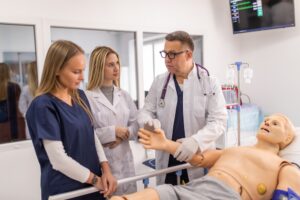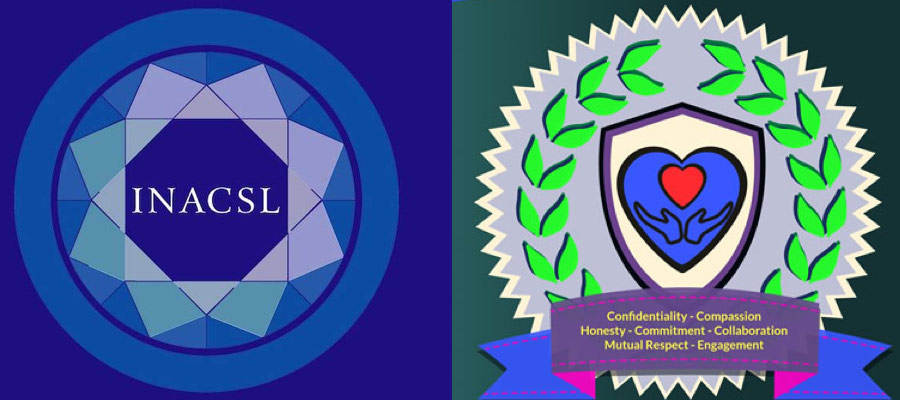ASPiH Simulation Standards
Association of Simulated Practice in Healthcare (ASPiH) is a non-profit healthcare simulation organization in the United Kingdom. ASPiH published their initial standards in 2016, describing the attributes required to design and deliver effective simulation-based education and practice. The process took two years to develop a National Standards Framework for Simulation-based Education. The Health Education England (HEE) recognized the need for standards in the healthcare simulation field and was partly-funded by the Association for Simulated Practice in Healthcare (ASPiH) to produce an initial draft document that has been further developed into this final framework through consultation, research and expert input. In 2023, the ASPiH Standards were updated to reflect new knowledge and simulation practices. This HealthySimulation.com article by Teresa Gore, PhD, DNP, APRN, FNP-BC, CHSE-A, FSSH, FAAN, will discuss the development, adoption, and update of the ASPiH Standards.
ASPiH Standards Development and Update
The ASPiH Standards Project Team consulted with over 40 pilot sites, received feedback from over 80 individual practitioners, and engaged with experts from key stakeholder organizations to ensure the document is relevant and applicable across the widest possible range of simulation-based experience (SBE) applications. These standards have provided a common framework within educational and healthcare sectors, and underpinned quality assurance for simulation providers, regulators, professional bodies, and commissioners.
Sponsored Content:
During the Standards development, ASPiH overlapped with each of the four themes of the current standards and the key domains, sections, or elements of professional and regulatory body standards for education and training. The other organizations and domains were Continuing Professional Development (CPD), General Medical Council (GMC), General Pharmaceutical Council (GPhC), Health and Care Professions Council (HCPC), International Nursing Association for Clinical Simulation and Learning (INACSL); interprofessional education (IPE), Nursing and Midwifery Council (NMC), and Society for Simulation in Healthcare (SSH).
In November 2021, ASPiH initiated a formal review and an update of the framework to meet the current needs of simulation practitioners and learners, reflect the evolution of simulation practice, account for emerging technologies, and address themes such as interprofessional simulation, sustainability, equity, diversity, and inclusion. The revision process included a literature review, consultation with Subject Matter Experts (SME) through virtual and face-to-face meetings, analysis of contributions, drafting of the revised standards and peer review by international simulation experts, stakeholder discussions, and a member survey capturing perspectives on the proposed draft.
The revised ASPiH Standards focus on elements and principles of theory and evidence-based practice applicable over the broad spectrum of simulation in health and care as a guiding compass for decision-making as an educator. The ASPiH Standards for Simulation-based Education in Healthcare are:
- Faculty Development: Focus on a safe learning environment to promote self-reflection, continuing professional development, and competent in the process of debriefing.
- Technical Personnel: Simulation technicians and technologists working towards or have obtained registration with the Science Council.
- Program: Simulation-based education is aligned with formal curriculum mapping or needs assessment analysis in clinical or educational practice, patient-centered, and simulation-based education design has oversight by a faculty with simulation expertise to remain current, and regular evaluation of faulty and program.
- Assessment: Assessment is based on learning outcomes for knowledge, skills, and attitudes for professional curricula, maintains psychological safety, and faculty responsible for patient safety and concerns regarding learning performance.
- In Situ Simulation: Clearly defined objectives to achieve individual, team, unit, and organizational competencies, activity is delivered authentically based on local processes and procedures, and faculty are proficient in topic and simulation.
- Resources:
- Simulation Facilities and Technology
- Management, Leadership, and Development
This is the preferred citation for the ASPiH Standards: Diaz-Navarro C, Laws-Chapman C, Moneypenny M, Purva M. The ASPiH Standards – 2023: guiding simulation-based practice in health and care.
Sponsored Content:
View the LEARN CE/CME Platform Webinar Clinical Simulation Professional Development: A Scaffold Approach to learn more!
About ASPiH
ASPiH, aka The Association for Simulated Practice in Healthcare, is a UK-based non-profit membership organization formed in 2010 that is made up of professionals from the fields of healthcare, education, and patient safety. These members include researchers, learning technologists, workforce development managers, education managers, administrators, healthcare staff, and students. Members of the ASPiH have a genuine interest in new and innovative learning methods and wish to optimize the use of available clinical simulation resources in their work.
Bridging undergraduate and pre-registration education together with postgraduate and post-registration training and ongoing CPD, membership with this association is available to the entire health and social care workforce. Through this membership, the association is dedicated to forming a collaborative community to improve patient care quality, safety, and effectiveness by advancing excellence in simulation in healthcare within workforce development and clinical practice.
In providing insight and opportunity to participating members, the Association for Simulated Practice in Healthcare aims to provide an effective communication network for those involved in healthcare simulation and technology-enhanced learning across the UK and beyond. The ASPiH also seeks to provide quality exemplars of best practice in the application of medical simulation to education, training, assessment, and research in healthcare.
To support the expansion and uptake of simulated practice, the association has established benefits and evidence of impact that link the practice of nursing simulation with improvements in overall patient safety and quality of care. Drawn from experience within the association and from links with relevant educational bodies nationally and internationally, the ASPiH develops and shares key operational and strategic resources to all members.
The purpose of the ASPiH conference is to advance the discipline of SBE and provide an innovative scientific program for colleagues and experts to share and disseminate best practices on SBE in healthcare. In working to achieve this goal, the conference offers the opportunity to network formally and informally through its hosting of special interest groups, professional meetings, and social programs and provides delegates with a forum.
The Association considers that all individuals involved in the design, delivery, evaluation, and translation of simulated practice should adhere to the ASPiH 2023 core values of
- Safety
- Equity, diversity, and inclusion
- Sustainability
- Excellence
Each year, ASPiH holds an annual conference and network meeting. The conference themes are chosen to help participants explore, share, and evaluate something important, current, or innovative.
In recent years, we have focused on equity, diversity and inclusion, and sustainability. In 2024, our conference theme will be transformative simulation, a paradigm shift. As we celebrate 15 years as the Association for Simulation in Healthcare Practice, we invite you all to help us explore, collaborate, innovate, research, evaluate, and, of course, celebrate this exciting and evolving modality.
Association for Simulated Practice in Healthcare Standards Latest News

Global State of Patient Safety: Annual Review

Looking Ahead: 2023 Healthcare Simulation Events

How to Incorporate Ethical Awareness in Healthcare Simulation Practice

Research: A Prebriefing Guide for Online, Virtual, or Distant Simulation Experiences

Should Clinical Learners Wear Uniforms During Healthcare Simulation Experiences?

Recap: 2021 Healthcare Simulation Events Helped Highlight Industry Updates

Clinical Simulation Research: The Role of the Presimulation Briefing

ASPiH 2021 Challenges Healthcare Simulation Professionals to Move Upstream, Facilitate Change

New INACSL Healthcare Simulation Standard of Best Practice: Professional Development

Healthcare Simulation Week 2021 Promotes Community Globally

Collection of Healthcare Simulation Policies and Procedures Manuals

INACSL Standards of Best Practice for Clinical Simulation Infographic: Professional Integrity
Sponsored Content:














